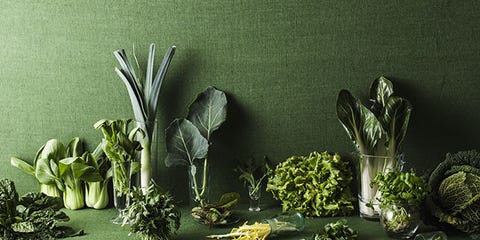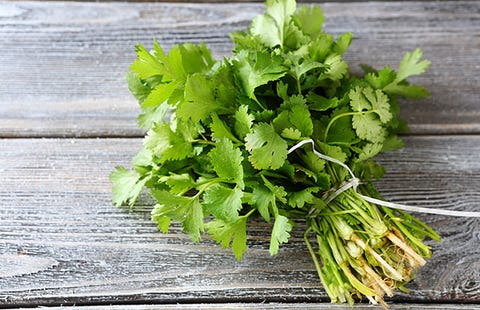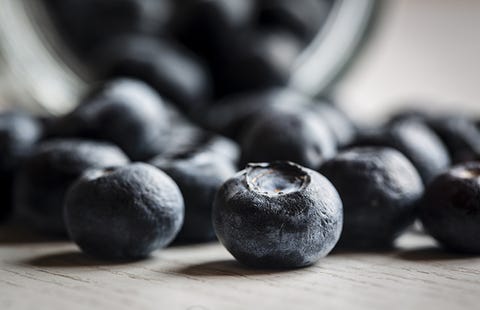What Does Food Coloring Do to the Body

Larry Washburn/getty images
We've already established that juice cleanses—despite their alluring marketing and celebrity endorsements—won't actually detox your body. In fact, detoxification happens no matter what you eat, and it's a job handled by your liver and kidneys, not some pricey diet of liquefied greens. But are there any foods that could make it easier for your body to perform its own detox duties?
Well, kind of.
Here's the deal: There's no singular food or substance that will magically flush toxins out of your body—not green tea, not lemon water, not apple cider vinegar. "It's more about eating healthy foods that allow the body's natural detoxification mechanisms to work appropriately," says Tom Rifai, MD, regional medical director for metabolic health and weight management at the Henry Ford Health System in Detroit. "That's really the better way to think about it."

olha afanasieva/shutterstock
True, there are one-off studies showing certain foods can have a detox benefit, explains Cindy Geyer, MD, medical director at Canyon Ranch in Lenox, MA. Cilantro, for example, has been found to prevent absorption of heavy metals like mercury, meaning it's excreted instead of processed by the liver. Cruciferous veggies like broccoli contain antioxidant compounds that seem to aid your liver in its detox processes. Flavonoid antioxidants, found in most berries, can increase blood flow to the kidneys, helping them filter out toxins better.
But the real takeaway isn't to load up on these foods alone. Instead, Geyer says, it's most important to eat a diverse array of plants. Not just cilantro, but parsley, too. Not just broccoli and blueberries, but beans and carrots and bananas and any other plant you can toss in the grocery cart.
MORE: The Surprising Reason You Shouldn't Chug Water With Your Meals
This is important for two reasons. The first? Fiber. "If there are toxins you're inadvertently ingesting, fiber can act like a scrub brush for the colon, binding to toxins and helping you excrete them rather than absorb them," says Geyer.
The second reason has to do with your gut bacteria (doesn't everything?). Plant foods are rich in prebiotics, or indigestible fibers that serve as a main fuel source for your gut bugs. And eating lots of prebiotics ensures that you'll develop a large, diverse, healthy population of gut bacteria. Healthy gut bugs, says Geyer, help maintain the barrier of your digestive tract, ensuring that no toxins escape into the blood stream where they'll eventually have to be dealt with by the liver or kidneys. The stronger your gut bugs, the stronger the barrier, and the better equipped you are to keep toxins away from your detoxifying organs.

lacaosa/getty images
On the flip side, however, there are plenty of foods and substances that can toxify your body, and cutting back on them can reduce the workload for your liver and kidneys. The first (and most obvious) is alcohol. In order to eliminate alcohol from the body, your liver has to break it down into smaller parts, and some these byproducts are also toxic, and can damage liver cells, cause inflammation, and weaken your immune system, according to the NIH. (Here are 8 things that would happen if you stopped drinking alcohol for 2 weeks.)
Mercury—a heavy metal found in high concentrations in certain fish—is another common concern for toxicity.
Rifai also warns against habitually eating CRAP (that's "calorie-rich and processed") foods. These packaged products pack in high concentrations of refined carbohydrates and unhealthy fats, which promote inflammation that can damage the liver over time, preventing it from doing its job effectively, he explains.
It's also a good idea to buy organic produce as much as your budget allows: Geyer says minimizing exposure to pesticides helps lighten the load for your liver. (If you can't afford to go full organic, use this guide from the Environmental Working Group to determine when it's most important.)
The bottom line: "There's no short-term detox plan. It's the choices you make day in and day out that can really help you or hurt you," Geyer says. So go easy on the alcohol (one drink a day for women, two for men), cut down on processed foods, and eat a variety of plants. Then let your body handle the rest.
This content is created and maintained by a third party, and imported onto this page to help users provide their email addresses. You may be able to find more information about this and similar content at piano.io
What Does Food Coloring Do to the Body
Source: https://www.prevention.com/food-nutrition/healthy-eating/a20457227/detox-foods-for-your-body/